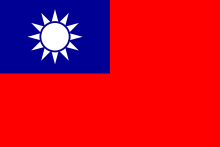Republic of China at the Olympics
| Republic of China at the Olympics |
|||||||||
|---|---|---|---|---|---|---|---|---|---|

|
|||||||||
| IOC code | ROC | ||||||||
| NOC | Chinese Taipei Olympic Committee | ||||||||
| Medals |
|
||||||||
| Summer appearances | |||||||||
| Other related appearances | |||||||||
|
|
|||||||||
The Republic of China (ROC) participated in its first Summer Olympics in 1932 under the name of "China". After the Chinese Civil War the ROC retreated to the island of Taiwan, only Taiwan-based athletes have competed on behalf of the country since then. The ROC protested the 1979 Nagoya Resolution by boycotting the 1976 Summer Olympics; this continued until the ROC competed under the deliberately ambiguous name "Chinese Taipei" in the 1984 Winter Olympics. China also took part in the Opening Ceremony of the 1924 Summer Olympics, but its four athletes (all tennis players) withdrew from competition.
The Nagoya Resolution brought about the participation of the PRC in Olympic Games activities by designating that the Republic of China would be identified as Chinese Taipei and any identifying flag, anthem, or emblem used in Olympic activities would be without symbolism to show the existence of the ROC and demonstrate its sovereign nation status.
A number of previous IOC actions enabled the IOC to include both the PRC and the ROC in Olympic activities despite the attempts by the former to argue that the ROC identity be as a subordinate branch of the PRC NOC. The PRC objected to the ROC NOC having that designation because it included the word "national", and the PRC did not recognize it as a nation. The solution to that issue was the IOC Charter provision that a country or nation designation could also include geographical area, district or territory. The 1997 revision of the IOC charter reinforced the legitimacy of some form of a ROC NOC being recognized, as the IOC Charter (Article 31.1) was clarified to define the term "country" as an independent state with international recognition.
...
Wikipedia
